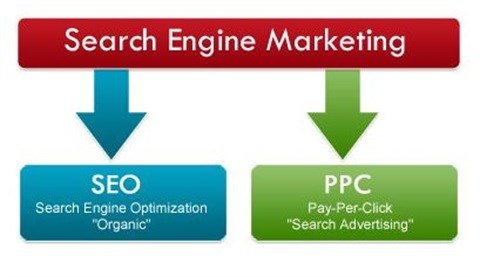Biz4Afrika decided to enlist some expert help from Elwyn Dhliwayo, CEO of SEO Specialist, and we've got answers for all of your SEM-related queries.
What is the difference between SEO and SEM? Which, in your opinion, is more effective? Can you have one without the other?
Many people find it difficult to distinguish between Search Engine Optimisation (SEO) and Search Engine Marketing (SEM). In most cases, both terms are often used interchangeably, which makes it even more confusing.
I will sum up everything in a simplified diagram.

As can be seen in the diagram above, SEO is simply a component of SEM. Therefore, SEM includes elements of paid search, such as PPC and also Social Media Marketing (SMM).
SEM is more effective in the short term, especially when you begin online marketing, as it has the ability to generate instant exposure, leads and sales for your business. However, as you run your SEM campaigns, it is crucial to invest in SEO as it will generate significantly higher returns in the long run. SEO results are permanent and will last for years!
In my opinion, for a business to achieve the best results from online marketing, it is important to make use of all elements of SEM, which are, SEO, PPC, and SMM. These three work together. For example a business can use PPC to drive traffic to the website, while SMM creates brand awareness and user engagement and then SEO ensures that the business website becomes more visible for valuable keywords / phrases that actually result in a lead or sale. I personally use Google Adwords (PPC or pay per click) as a research tool to inform organic search (SEO) and it really works.
How does SEM work? What are the main pros and cons of implementing SEM? Why should small businesses use it?
With PPC, you allocate a budget for your paid search campaigns and only pay when users click on your advertisements. On the other hand, for SEO, you pay an SEO specialist to optimise your website on a monthly basis, so it can be more visible on Google for keywords or phrases that are related to your business. All these efforts are aimed at generating more website visitors, enquiries / leads and sales for you company.
Below is a summary of SEM pros and cons:
Pros:
It's FREE. Search engines will not charge you anything to have your website come up in organic search results. However, you will need to pay an SEO specialist to optimise your website to rank high in the search engine result pages (SERPs) for keywords related to your business. It's authentic. Users trust organic search results a lot more than paid search results.
Cons:
Paid search traffic
Pros:
Cons:
How effective is SEM - what sort of return do businesses get on their investment? How much, on average, will they pay for a click through to their site?
94% of customers research products and services online before making a purchase. Businesses that have websites and market online can reap the rewards of connecting with these prospective customers. A lot of small business have recorded over 300% return on investment. It all demands on your SEM strategy.
With SEO, you do not pay for clicks on your organic listings in search results. However, with paid advertising, you only pay when a user clicks on your ad. The cost of a click is dependent on a number of factors, which include, industry cost per click, quality scores, and bids by other advertisers within your industry.
How do you choose keywords?
Generally, SEM companies will make use of various tools to choose keywords for SEO and paid advertising campaigns.
Firstly I use the Google Keyword Planner to identify keywords with high monthly searches and a fair amount of competition and cost per click (CPC). As I run my paid search campaign, I then analyse my paid search campaigns to collect valuable data on keywords that have good conversion rates, low bounce rates, click through rates (CTRs). Having identified the keywords that convert into real customers for your business, I then use these keywords for SEO. This ensures that we focus all SEO efforts on keywords that we know will generate traffic, leads and sales for your business, thereby, eliminating all guesswork related to SEO.
Once a business has paid and implemented SEM, are they likely to retain the audience? Is SEM targeted, or is it common that people click to the site only to realise that it is not what they were looking for?
Yes. It is possible to retain the audience. For example, you can make use of remarketing list, email list etc to capture your existing audience.
SEM is highly targeted, measurable and scalable! However, all campaigns, be it SEO or paid search, needs to be properly managed and optimised to prevent wasted spend that results from people clicking into and out of the website.
What advice would you give to a small businesses looking to implement SEM? How long should they run an SEM campaign and what is the best way to get started?
Every small business needs to invest in SEM in order to remain profitable. SEM is a continuous process, for as long as it generates positive ROI, you need to continue running your SEM campaigns. To get started, you can contact SEO Specialist who will setup a meeting with you to discuss your SEM requirements.
Thank you to Elwyn for answering our questions!
If you want to get in touch with SEO Specialist to discuss implementing SEM for your small business, you can call them on 011 051 3109 / 062 216 2145. Alternatively, email them here. They happily accept clients with any budget and work towards getting you the best possible results at the available budget.

Biz4Afrika is a Microsoft small business community hub. Biz4Afrika is making it possible to get online for free, spread your customer net wider and bring in more sales. Small businesses can register, get their own personalised website, their own internet address, personalised email address, as well as offers from over 30 partners to help your business grow.
Go to: https://southafrica.biz4afrika.com/